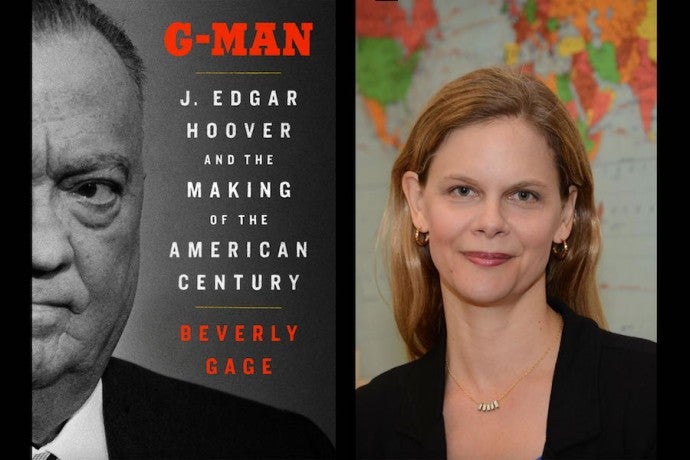Tracking down the FBI’s most famous director: Arts Camp Alumna Beverly Gage wins Pulitzer for her new biography of J. Edgar Hoover
Gage’s book sheds light on the controversial figure who helped found the FBI and then ran it for nearly 50 years.

When Beverly Gage woke up on a spring morning earlier this year, she wasn’t expecting to receive an announcement that would change her life.
“The Pulitzer doesn’t give you any advance notice,” Gage says. “They just announce it publicly. That's how you find out, and that's how the world finds out.”
Finding out she’d won the Pulitzer Prize for Biography was a deeply rewarding moment for Gage, who had poured over a decade of work into her acclaimed book on J. Edgar Hoover, director of the FBI from 1924 to 1972. Her book, titled G-Man: J. Edgar Hoover and the Making of the American Century, incorporates newly-unearthed research as she discusses how Hoover used intimidation techniques against Martin Luther King Jr., oversaw the capture of Nazi saboteurs from Atlantic submarines, and hid his life as a gay man from the world.
Gage says she owes much of her success to Interlochen Arts Camp, where her story began. At Camp, she developed the creative discipline that allowed her to finish an 837-page book on one of the United States’ most famous and controversial political figures.
Interlochen was really the first place that taught me what real commitment to true excellence looked like.
Excellence and chocolate ice cream
Though gifted as a writer, Gage didn’t attend Interlochen with writing in mind. She studied violin and piano in her three summers at Camp.
“Interlochen was really the first place that taught me what real commitment to true excellence looked like,” says Gage. “I saw what it took in terms of practicing to be at the top of your game. I took from those experiences a certain kind of discipline, the stick-to-itiveness to sit there day after day doing something until it's done.”
She also tried her hand at conducting, a skill that she says helped her synthesize the material for her book.
“I feel that the size and complexity of a score is a little bit like doing research,” she says. “You have to figure out all of the different moving parts, and then you have to figure out how they fit together.”
But it wasn’t just a commitment to excellence that Gage found at Interlochen. She also made friends—and took advantage of the on-campus ice cream shop.
“I really loved the soft-serve chocolate ice cream with sprinkles,” she recalls.
I was drawn to Hoover in part because, up until now, his public image has been so one-dimensional. He's so well known in our popular culture as a great villain of the 20th century. I just thought he had a much more complicated and interesting career.
Tracking down the FBI’s most famous director
In the years after Interlochen, Gage set her sights on becoming a historian. She earned a degree in American studies at Yale, then earned her PhD in history from Columbia University in 2004. By 2009, Gage had begun to narrow her focus to a historical figure she found especially intriguing: J. Edgar Hoover.
“I was drawn to Hoover in part because, up until now, his public image has been so one-dimensional. He's so well known in our popular culture as a great villain of the 20th century. I just thought he had a much more complicated and interesting career,” she says.
Asked to summarize that career, Gage avoids characterizing Hoover as either a villain or a saint.
“Hoover built the FBI. He was famous as a ‘shining knight of the federal government,’ but also showed a pretty deep and serious conservatism toward his own favorite political projects. He consistently went after the American left, from Communists to civil rights activists.”
Gage’s book gives attention to the FBI’s campaign against Martin Luther King Jr., an episode she calls “dramatic” and “depressing.” She covers the 1942 incident in which the Nazis sent eight saboteurs over on German submarines, dropping off four of them on Long Island and four in Florida. After two of them confessed to the FBI, all eight were eventually captured.
Gage also discusses Hoover’s homosexuality, something the famed director—who never married—did his best to conceal: “A lot of the book is in fact about his relationship with the no. 2 man at the FBI, Clyde Tolson. Clyde was effectively his life partner, his spouse.”
At the end of the day, Gage says her mission isn’t to either condemn or excuse Hoover’s political legacy. Rather, she wants to honor the complexity of his story.
“Hoover has come down to us as an almost universal villain—someone best known for the worst things that he did,” says Gage. “This book tries to complicate that story without really attempting to redeem Hoover.”
Learn more about Interlochen Arts Camp.





